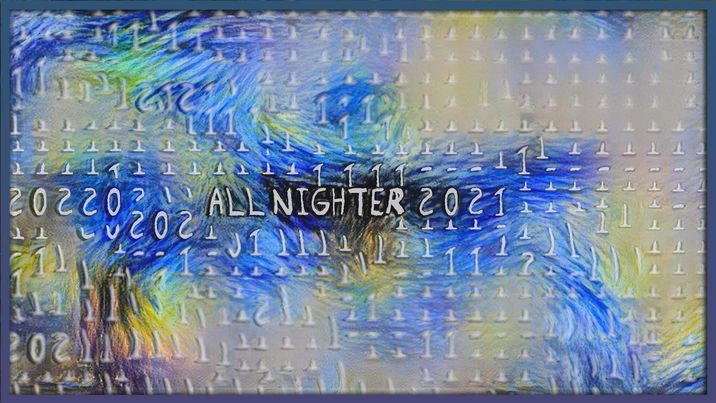
Courtesy of Michael Gancz
On April 9, personal creative projects from Yale students were showcased in this year’s All-Nighter Music and Arts Festival — an event featuring performances by over 20 poets, writers, musicians, actors, filmmakers, translators and experimental performance artists.
The festival was virtual for the first time. In the past, the festival was hosted in the Lighten Theater in the basement of Pauli Murray College. Although the Lighten Theater is now a COVID-19 testing site, Zoom made this year’s festival possible and more accessible than before. Usually, the festival lasts 12 hours — from 8 p.m. to 8 a.m. — but this year, to avoid Zoom fatigue, it only lasted five.
“Being online, and the DIY culture that has spawned from being home, has really encouraged people to try new things in a very interesting way,” said Michael Gancz ’22, creator and organizer of the festival. “We had first-time composers, animators, poets; That was very cool to see and one of the things that made this year’s event special.”
Gancz originally came up with the idea for the festival two years ago. Gancz, who studies music composition, noticed a lack of spaces for composition students to perform and record their pieces. As a member of the first class of students in Pauli Murray College when it was established in 2017, Gancz wanted to strengthen community spirit by launching an event that would bring people to “the north end of campus.”
Candice Wang ’21 met Gancz through the Davenport Pops Orchestra, or DPops, in which he conducts and she plays violin. During the festival, Wang read a personal essay titled “The Palace Within,” a reflection on reproductive health through the lens of Chinese medicine. Although she previously published her essay in The New Journal, the festival was her first opportunity to perform her writing aloud.
“It was very gratifying to see responses to it, and also just a whole different feeling when you read it outloud, the essay comes alive more,” Wang said.
Chayton Pabich ’21 performed a 15-minute portion of his senior project, which is a play called “Flores Caídos.” For last year’s festival, Pabich performed a choreopoem using black paint and falling flower petals at 3 a.m. That same piece became the rough draft for “Flores Caídos.”
Pabich described “returning to the festival with the final product of what was born at that festival the year before” as fate.
Pabich’s selection for this year’s festival included his translation of a monologue from a work called “Doña Rosita La Soltera” by Spanish poet Federico García Lorca. This monologue was followed by Pabich’s original rap called “Deshojar” which featured music that Gancz composed.
“Ultimately the All-Nighter is a festival of music, arts and culture,” Pabich said. “I wanted to offer a performance that engaged all parts of the festival.”
Nimran Shergill ’24 debuted her poem titled “An Ode to Golden Brooches” in the form of a short film. Based on the story of the Greek tragedy Oedipus Rex, the poem was read aloud by Serengeti Cox-Rodriguez ’24 and presented in kinetic typography created by Gancz.
Wang said that she missed experiencing the Yale music and arts community in person, but it was “lovely” to see familiar faces during the festival.
“Part of being at Yale and being in the music-arts scene is that you are constantly surprised by how amazing everyone is,” Wang said. “It was nice to get another taste of that before I graduate since I was pretty active in the music scene before.”
Yet Gancz noted that not all elements of the festival were translatable to a virtual experience. Gancz added that this year’s festival lacked physical interaction, last minute improvisations and even the discomfort of collectively sitting in the Lighten Theater for 12 hours. Gancz and Wang both look forward to an in-person version of the festival.
“I am skeptical of Zoom substitutions,” Gancz said. “In trying to become the thing, it only reminds us of what we’re missing.”
The Lighten Theater seats 65 people during a normal year.
Correction, Apr. 22: An earlier version of this story referred to Wang’s essay as “The Baby Palace.” In fact, it is actually titled “The Palace Within.” The story has been updated.







